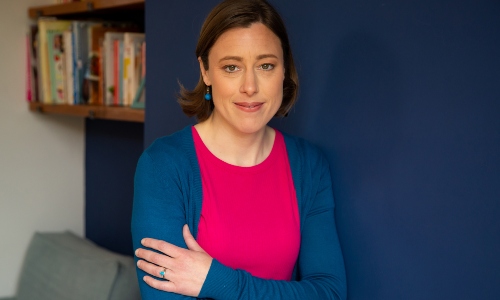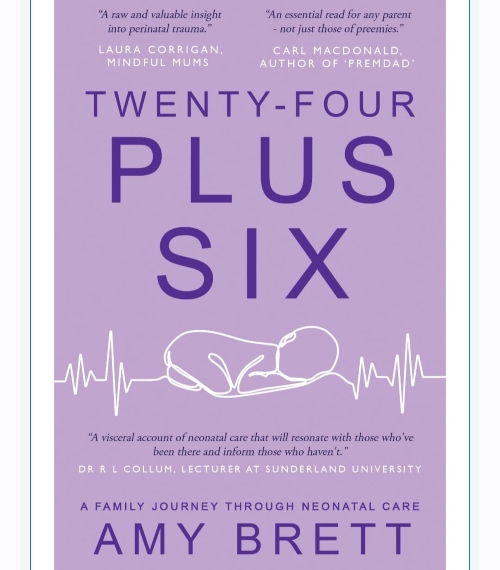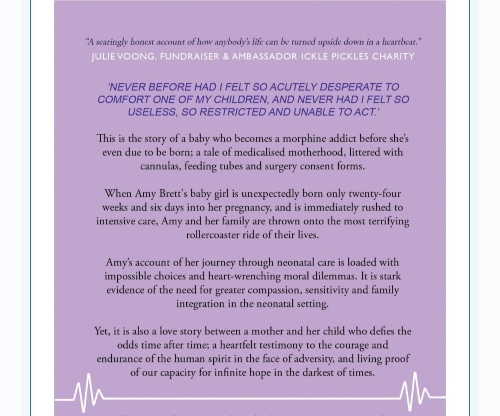Making room for mental health on the neonatal unit
Awareness Day
The Neonatal Mental Health Awareness Week runs from the 18th until the 22nd of September and was founded by Leo’s Neonatal, a charity set up in memory of little Leo, to highlight the need to prioritise mental health and well-being in the neonatal setting. To show how a NICU experience can affect mental health, we are sharing a blog by Amy Brett, author of ‘Twenty Four Plus Six’ and proud NICU Mum which also includes some signposts to helpful services.
The birth of a baby is often celebrated as a joyous occasion, but when your little one is born sick or premature and placed in neonatal care, the experience can be rather different.
There’s no triumphant homecoming. No “Welcome New Baby” balloons. No fussing aunts cooing over the newborn.
Instead, there are tubes, wires and machines. Incessant beeping and alarms. Cannulas, lumbar punctures and constant heel pricks. Blue rubber gloves and the smell of Clinell wipes.
There’s separation, uncertainty, fear, guilt, exhaustion, confusion and stress.
The impact on you as a mum or dad, and on your wider family, can be overwhelming, particularly in terms of the emotional toll, and your mental health can suffer a huge blow.
According to Bliss, "Having a baby in a neonatal unit can be incredibly stressful and emotional. Parents are much more likely to suffer from mental health problems."
Understanding the Struggle
Emotional Turmoil
Giving birth and having a newborn to care for is emotionally challenging even when things go to plan and everyone is well. The experience of giving birth and then watching your baby battling to survive in neonatal care heightens the challenge a hundredfold, resulting in a crazy daily rollercoaster of feelings, including anxiety, helplessness, guilt, isolation, anger and fear.
Physical Separation
Never before had I felt so acutely desperate to comfort one of my children, and never had I felt so useless, so restricted and unable to act.
As a parent of a baby in neonatal care, you can sometimes face physical separation from your newborn due to their and/or your medical needs. The inability to hold, touch, or nurse your baby can create feelings of helplessness. This is something I really struggled with when my daughter was in neonatal intensive care and I discuss it in detail in my book about our neonatal journey.
Guilt and Blame
As a parent, you can often end up blaming yourself for your baby’s health issues, even though the cause for them was more than likely due to factors beyond your control.
Something I found really hard was the idea of my daughter’s premature birth resulting in her having some kind of profound life-changing impairment that I somehow felt responsible for. It was a huge burden to carry and made the stresses of the neonatal journey even harder to deal with.
Anxiety
It wasn’t hard to work out that no one had a clue whether my child would live or die. Even during the very first conversation with the neonatal registrar, any positive observation, every small triumph, was swiftly qualified with: ‘but it’s early days’, ‘but things can change so quickly’, ‘so it’s good for now, but we’ll see what happens’.
Many neonatal stays don’t involve extreme life-or-death situations. But the uncertainty surrounding your baby’s health, your probably limited understanding of all the clinical equipment and medical jargon, and the fact you’re suddenly having to juggle spending time on the ward with all your other commitments, can all result in feelings of anxiety and panic.
Impact on Mental Health
Postnatal depression affects 1 in 10 mums and can also affect dads and partners. Other mental health issues that can occur after childbirth include psychosis, panic attacks, anxiety, intrusive thoughts and PTSD (Post Traumatic Stress Disorder).
According to Bliss, parents who have a baby in neonatal care are more likely to suffer from postnatal depression. Findings from Bliss research suggest that:
- 80% of parents’ mental health got worse after their time in the neonatal unit.
- 23% of parents had anxiety after their neonatal stay
- 16% suffered PTSD
- 14% had postnatal depression
- 1% had postpartum psychosis
- 6% reported other diagnoses including separation anxiety, suicidal thoughts and OCD (Obsessive Compulsive Disorder).
I wasn’t officially diagnosed with any mental health issues after our 5 month neonatal stay, but that’s perhaps only because support wasn’t readily available to me. At that time, there was no mental health and wellbeing support offered to parents on the ward and the practicalities of getting outside help when I was already juggling so much made it impossible. But unofficially, I suffered from intrusive thoughts, anxiety, depression and stress.
Consequences
As a parent of a baby in neonatal care, this emotional upheaval and impact on your mental health can result in a variety of disturbing consequences such as:
- Feeling overwhelming sadness, anxiety, or hopelessness
- Having trouble sleeping or concentrating
- Losing interest in activities you normally enjoy
- Having thoughts of harming yourself or your baby
- Experiencing a sensation of numbness
- Having vivid nightmares.
What might help?
What could help parents and families whose emotional wellbeing and/or mental health have been impacted by a neonatal journey?
Open Communication
A relationship of trust and understanding between you as parents and your baby’s medical team is vital to your mental health and wellbeing. Doctors, nurses and other healthcare professionals should encourage you to express your emotions, thoughts and fears about your baby’s neonatal stay without judgement. A safe space for open dialogue can help alleviate anxiety.
Peer Support
Talking to other parents who are currently going through, or who’ve recently been through, similar experiences can provide you with a sense of community and understanding. Sharing stories and tips can be reassuring. You can either do this in person, perhaps with other families on the ward, or virtually via Facebook groups and other online groups for parents of sick or premature babies.
Parents of Preemies Support UK is the largest UK virtual support group for parents with premature babies. I found this group (and still do sometimes) really helpful when my baby first came home.
Therapy and Counselling
Having access to perinatal mental health professionals who specialise in dealing with the types of struggles that you face as parents of a baby in neonatal care can be invaluable. They can provide helpful coping strategies and emotional support.
If you’re unable to access formal therapy, there’s also the option of support tools or online/telephone support lines. A couple of examples are:
- Bliss Parent Support Tool
Bliss offers a support tool that provides parents with information and tools to navigate the neonatal journey.
- Mind's Mental Health Support Line
https://www.mind.org.uk/information-support/helplines/
Mind provides a helpline for individuals seeking to discuss their feelings and receive emotional support and guidance on managing mental wellbeing.
Prioritising mental health and wellbeing
A journey through neonatal care is a unique and tough challenge that can have a detrimental and potentially long-lasting impact on parents’ mental health and emotional wellbeing.
The neonatal healthcare system is beginning to recognise this fact and to place much greater importance on supporting parents and families during this vulnerable period.
This week is Neonatal Mental Health Awareness Week, which was launched in 2019 by Leo’s Charity to highlight the need to prioritise mental health and wellbeing in the neonatal setting.
Since my baby was born in 2019 I’ve seen many more neonatal units gain access to specialised psychological support for parents. Things are slowly but surely heading in the right direction. Let’s hope this trend continues to gain momentum.
If you know someone who might benefit from reading this article, please share it with them.
1 in every 7 babies born in the UK is admitted to neonatal care - more than 100,000 every year. Amy's book raises awareness of what it's like to go through a neonatal journey at such a vulnerable, emotional and precious time in a parent's life.
Amy Brett’s book Twenty-four Plus Six is a heart-wrenching memoir that shares the life-changing realities of having a baby born 15 weeks too early and is available to purchase.



















.webp)
.webp)
.webp)
